The theme for World Environment Day 2023 - Beating Plastic Pollution - is apt given that the issue has reached significant proportions. It is imperative that measures that are timely, relevant and efficient are implemented on a war footing. Concerted efforts are required from all sections of society - Government, corporates, NGOs and even individuals - to address such a colossal crisis.
India's policymakers have taken decisive steps to stem plastic pollution, including curbs on single use plastics. Last year, the Hon'ble Prime Minister Shri Narendra Modi launched Mission LiFE (the Lifestyle for Environment movement) - a visionary initiative that ITC is aligned with - to drive collective and individual action to deal with the waste problem and address environmental degradation.
Enterprises with their immense wherewithal must play a meaningful role in crafting unique solutions. Effective collaborations with key stakeholders like the government, communities and municipal authorities are critical for sustaining the progress on the ground and achieving scale.
As an exemplar in environmental stewardship, ITC is playing its part to address the solid waste challenge, including plastic waste, through sustainable and scalable solutions.
At the core of ITC's efforts lies its deep conviction that the purpose of corporates is to serve society and the planet. ITC's own unique business model therefore synergises the creation of shareholder value with social and natural capital, under a unique 'triple bottomline' approach. Over the past quarter of a century, ITC has traversed an incredible journey of transformation, achieving several de-fining milestones in sustainability. Today, it is the only company of comparable dimensions in the world to be Water Positive for 21 years, Carbon Positive for 18 years, and Solid Waste Recycling Positive for 16 years.
ITC is committed to reducing its environmental footprint and replenishing natural resources and has identified waste management as a key focus area. The Company follows a 360-degree approach towards waste management that is based on a three-pronged strategy. First, ITC works on minimising its footprint within its operations through systematic monitoring and improving efficiencies in material utilisation and maximising recycling. Second, outside the fence, ITC focuses on tackling the enormous problem of waste generation by crafting sustainable and scalable solutions based on the principle of circular economy. Third, ITC is also investing in cutting-edge innovation in the area of sustainable packaging to substitutes single-use plastic.
The Company became plastic neutral in 2021-22, much ahead of its target by collecting and sustainably managing more than 54,000 tonnes of plastic waste, which exceeded the amount plastic packaging introduced in the market by ITC during the same period. Furthermore, the Company sustained its Plastic Neutrality status for the second year in a row by sustainably managing 60,000 tonnes of plastic waste in 2022-23, which was more than the amount of packaging introduced in the market by ITC in 2022-23
ITC's journey of becoming Plastic Neutral encompasses several stories of positive change - at the product level, at the organisational level and the community level. ITC has worked on creating solutions that are not just innovative, but also scalable, replicable and sustainable. A key aspect of this effort has been to reduce and manage Single-use Plastic. Here are some examples:
ITC has developed robust, next-generation and environment-friendly solutions that serve as ingenious substitutes for single-use plastics through intense R&D and innovation efforts.
ITC's Paperboards and Packaging Businesses have spearheaded a multitude of sustainable are actively engaged in developing and promoting sustainable packaging solutions on the laminated board and moulded fibre platforms to substitute single-use plastics. Leveraging the cutting-edge innovation done at ITC's Life Sciences and Technology Centre (LSTC), ITC has launched recyclable paperboards, 'FiloPack' and 'FiloServe', and biodegradable paperboards, 'OmegaBev' and 'OmegaBarr', which are alternatives to plastic coated containers, cups and other deep freeze applications. To replace plastic containers in Food delivery, ITC has introduced the paperboard-based, IndoBowl. In addition, ITC has launched WrapWell, an easily-recyclable food grade paper that serves as a substitute for aluminium foil. Sign-up Green is ITC's laminated paperboard offering that is a more sustainable alternative to plastic-based indoor advertising. ITC has also replaced plastic sticks in its earbuds with durable paper. The company has also introduced Cyber anti-fungal packaging for its soaps, which lessens the amount of plastic packaging used. As an alternative to single-use plastic packaging, e-commerce players can opt for ITC's 100% recyclable Tough Pack.
Bio-seal, an environment-friendly paper-based tea envelope bag with a 100% biodegradable coating, provides a good alternative for multilayer plastic bags. BioSeal is a patented ITC innovation. ITC has also developed an ultra-high barrier recyclable laminate for a coffee bean pack which is manufactured with green energy and is one of the eco-friendliest beverage packaging solutions. Other solutions include an eco-friendly, leak and spill proof paperboard-based pack to replace ice-cream plastic tub.
ITC's leading world-class Indian brands, like Aashirvaad, Sunfeast YiPPee!, Fiama, Savlon have also stepped up efforts to support the cause of beating plastic pollution through innovation.
An example is ITC's launch of stylish and eco-friendly lifestyle products under the 'Terra by YiPPee!' initiative. These eco-products include laptop sleeves, tote bags and stationery pouches that are hand-produced from upcycled YiPPee! snack wrappers.
Meanwhile, ITC's Personal Care brands, are gradually implementing recyclable options. ITC Savlon recently became the first soap brand in its category to use 70% recycled plastic material in the PET film of its glycerine soap wrappers. The recycled plastic was sourced from used products such as PET bottles. Moreover, the metallised plastic layer present in the Engage Cologne cartons has been eliminated to make the secondary packaging into 100% Paper-based recyclable cartons.
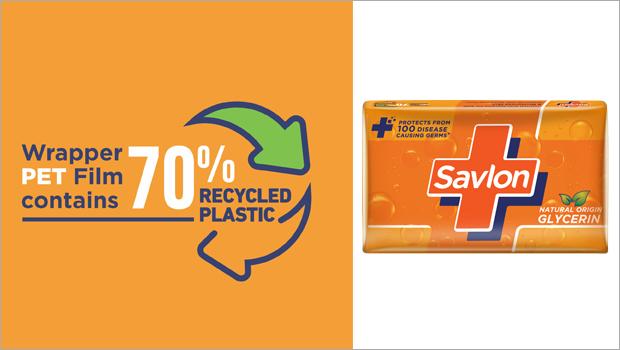
Aashirvaad is India's leading branded atta. To reduce plastic packaging, ITC Foods Business has innovated a packaging that is less plastic intensive. For its Aashirvaad Organic Whole Wheat Atta (1kg Pack), the Business worked with ITC's Paperboards and Specialty Papers Business to develop a packaging that uses a larger proportion of paper as compared to the earlier format of 100% plastic pack with PET/PE laminate.
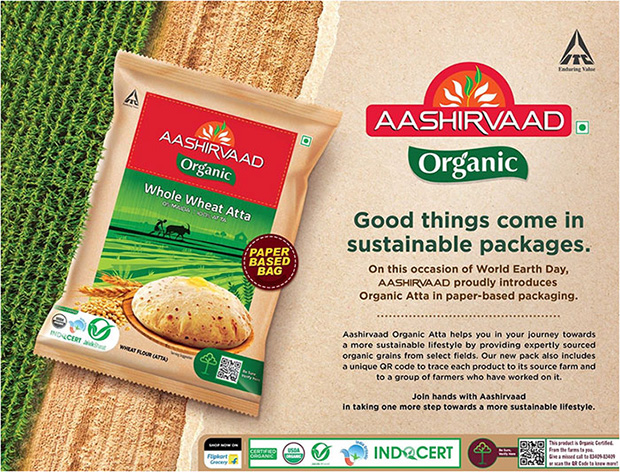
RPET is recycled PET, which is plastic that has been processed into something new. At ITC, the focus on sustainable packaging has led to a RPET success story in shower gel bottles. The packaging for Fiama's Shower Gel uses recycled plastic. ITC's Personal Care Business has been steadily increasing the recycled content and the Fiama Shower Gel bottles now use 50% RPET.
Initiatives like these are product sustainability in action and help reduce Single-use Plastic and Plastic Pollution.
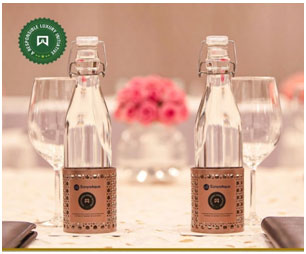
ITC's Hotels Business is one of the world's greenest hotel chains. The business has reduced the use of single-use plastics from around 150 touch points across its operations. This helps it eliminate around 2.5 lakh kg of plastic per year.
The Hotels Business uses special packaging materials made from compostable materials. It has replaced plastic water bottles at its hotel properties with glass ones. Plastic drinking straws and stirrers, as well as other plastic items, have been substituted with paper and wood-based alternatives.
Initiatives like these have helped ITC's Hotels business to cement its reputation as a trailblazer in the area of Responsible Luxury.
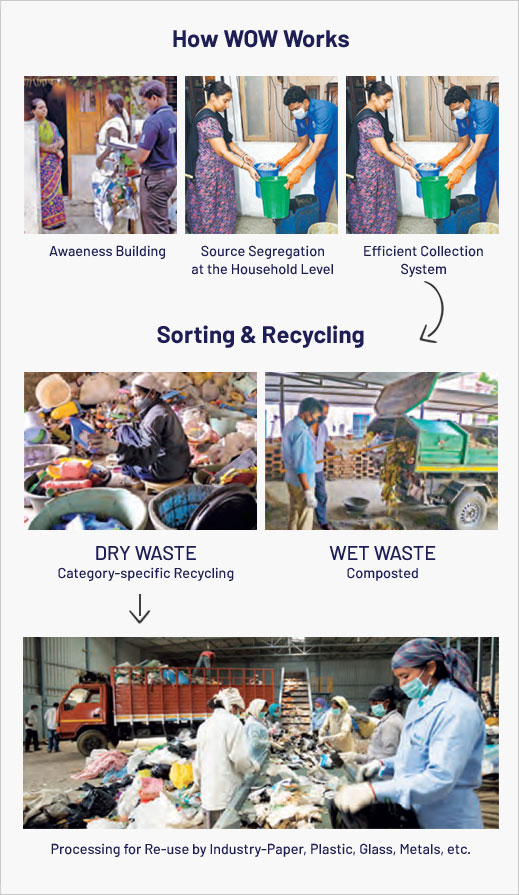
ITC is also driving interventions that leverage community collaboration to enable Plastic Free Living and to end Plastic Pollution.
A major obstacle to collecting and recycling any waste, including plastic, is low awareness. Hence, behavioural change efforts are essential for greater community ownership and adoption of habits like source segregation, which lead to higher recycling of plastic.
ITC's flagship initiative - Well-being Out of Waste (WOW) - contributes to India's Swachh Bharat Mission as a sustainable, replicable and scalable solution to segregate, collect and promote the reuse or recycle of solid waste.
WOW is a unique Solid Waste Management initiative by ITC that is a public private partnership with municipalities and communities in several states of India. It is effective primarily because it spans the spectrum of waste management.
Working with communities (households, schools, etc), WOW promotes awareness about the importance of source segregation and recycling. The advocacy helps communities to become more aware of pollution and the need to reduce waste through segregation. This behaviour change is critical to sustain a community movement towards reducing pollution.
WOW has established systems to ensure effectiveness over the long term. It collaborates with local municipalities to train waste workers and rag-pickers in waste practices, thus promoting sustainable livelihoods for waste collectors. It also creates an efficient collection system that covers nearly all user segments - households, offices, schools, hospitals, commercial establishments, among others. WOW works towards and enables a cleaner environment for communities.
Another key initiative is finding new ways to recycle Multi-Layer Plastic (MLP). In Pune, ITC is spearheading a circular economy based first-of-its-kind MLP collection and recycling programme.
In addition to the WOW initiative, ITC contributes to the Swachh Bharat Mission through the Mission Sunehra Kal programme. As a part of this, ITC promotes Solid Waste Management models that reduce waste being sent to landfill. Active in 18 districts of 10 states, the SWM initiative covers over 25 lakh households.
The SWM model is about reducing waste for cleaner, less polluting environments.
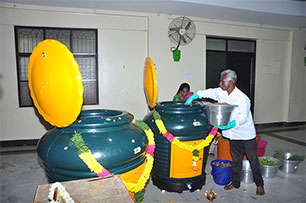
The Green Temple Initiative is a closed loop waste management model that involves processing waste from temples (such as leaves and flowers) to provide biogas for kitchens and compost for gardens. This initiative has been expanded to cover 950 places of worship in Andhra Pradesh, Bihar, Uttar Pradesh, Uttarakhand, Tamil Nadu, Karnataka, Telangana and Maharashtra.
In line with its bold and ambitious Sustainability 2.0 agenda and to sustain its 'plastic neutrality' status, ITC is building on its existing solid waste recycling initiatives. The Company is endeavouring to ensure that, over the next decade, 100% of its packaging is reusable, recyclable or compostable/ biodegradable. Going forward, ITC will continue to scale up its sustainable solid waste management models, leverage life-cycle approaches for evaluating alternative packaging solutions and strengthen its innovative sustainable packaging solutions portfolio to Beating Plastic Pollution.